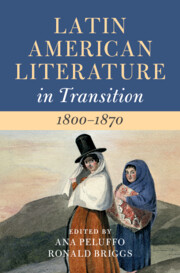Book contents
- Latin American Literature in Transition 1800–1870
- Latin American Literature in Transition
- Latin American Literature in Transition 1800–1870
- Copyright page
- Contents
- Figures
- Contributors
- Acknowledgments
- Introduction
- Part I Aesthetics of Disorder
- Part II Affective Communities
- Part III Intersectional Subjectivities
- Part IV Transoceanic Consciousness
- Chapter 20 Women’s Travel Writing
- Chapter 21 Hydraulic Modernity
- Chapter 22 History and the Transatlantic Imagination
- Chapter 23 Humboldt’s Aesthetic Populations
- Chapter 24 Argentine Darwinists
- Index
- References
Chapter 21 - Hydraulic Modernity
from Part IV - Transoceanic Consciousness
Published online by Cambridge University Press: 24 January 2023
- Latin American Literature in Transition 1800–1870
- Latin American Literature in Transition
- Latin American Literature in Transition 1800–1870
- Copyright page
- Contents
- Figures
- Contributors
- Acknowledgments
- Introduction
- Part I Aesthetics of Disorder
- Part II Affective Communities
- Part III Intersectional Subjectivities
- Part IV Transoceanic Consciousness
- Chapter 20 Women’s Travel Writing
- Chapter 21 Hydraulic Modernity
- Chapter 22 History and the Transatlantic Imagination
- Chapter 23 Humboldt’s Aesthetic Populations
- Chapter 24 Argentine Darwinists
- Index
- References
Summary
Latin American modernity has received numerous epithets, whose comprehensive enumeration defy the limits of this chapter.
- Type
- Chapter
- Information
- Latin American Literature in Transition 1800–1870 , pp. 329 - 343Publisher: Cambridge University PressPrint publication year: 2022



